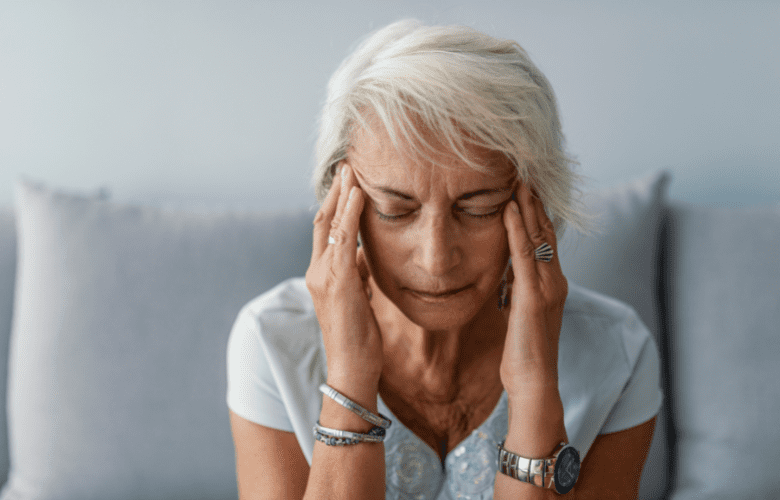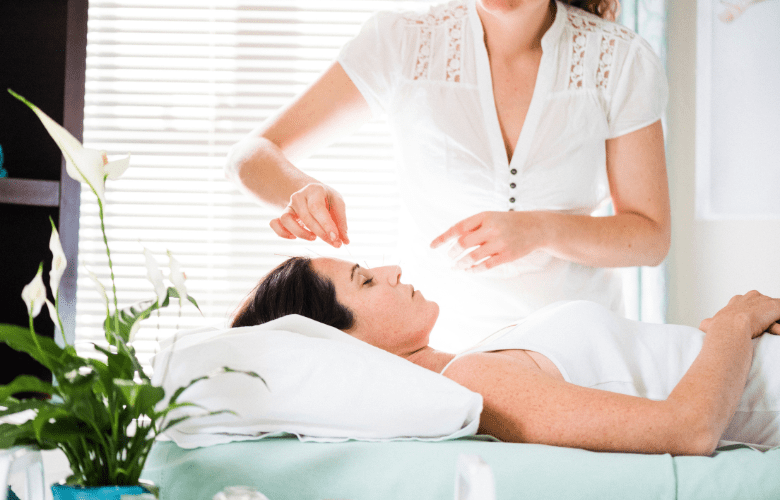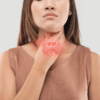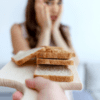Ease Anxiety Naturally with Acupuncture
Do anti-anxiety medicines make you feel sicker? Are the side effects causing you more headaches? Fret no further! You may want to consider natural ways to ease your anxiety. Acupuncture for anxiety is worth a try. Naturally, your lifestyle must also complement the treatment.
The American Psychological Association defines anxiety as “an emotion characterized by feelings of tension, worried thoughts, and physical changes like increased blood pressure.”
The most common symptoms of anxiety are:
- Fatigue
- Sweating
- Irritability
- Rapid heartbeat
- Labored breathing
- Difficulty sleeping
- Difficulty concentrating
And more!
Did you know that the word “anxiety” does not have a precise translation in Chinese medicine? Yet, several Chinese illness entities mimic anxiety quite well. The following four primary illness entities connect to anxiety:
- Agitation (Zang Zao)
- Panic throbbing (Zheng Chong)
- Fear and palpitations (Jing Ji)
- Mental restlessness (Fan Zao)
Occasionally feeling anxious during tough times is typical. But persistent anxiety is crippling. You should deal with it as soon as possible. Imagine how it can dramatically affect your life. You wouldn’t want your regular activities to get constantly derailed!
Every year, about 40 million American adults suffer from anxiety-related symptoms. Around one-third of them do not get relief from conventional interventions. So they seek alternatives.
Acupuncture is rising in popularity as a natural treatment for anxiety. Growing research shows its effectiveness for other mental conditions, too. It works more quickly than therapy and keeps you off of drugs.
Types of Anxiety Disorders
Anxiety isn’t always detrimental. Your brain takes it to warn you of potential threats. Thus, you can stay safe and secure. But when it gets out of control is a different story. This may indicate an anxiety disorder.
The following are types of anxiety disorders:
- Generalized Anxiety Disorder (GAD): This is characterized by unfounded worry about everyday situations. There is often an awareness that there is really nothing to be concerned about.
- Obsessive-Compulsive Disorder (OCD): This features recurrent, unwanted thoughts (obsessions). It is often accompanied by compulsive behaviors, such as excessive cleaning.
- Panic Disorder: There is a sudden wave of extreme anxiety and fear. A panic attack always follows. It often includes physical symptoms like tingling or trembling.
- Social Anxiety Disorder: This is also known as social phobia. Social settings can cause this overwhelming anxiety. Examples are meeting new people or giving a public speech.
- Post-Traumatic Stress Disorder (PTSD): This disorder develops following a traumatic event. Early symptoms may appear. At other times, they don’t begin until years later.
What causes anxiety?
Medical experts believe there are several contributing factors to anxiety. Among them are the following:
Genetics
You may be more likely to get an anxiety disorder if a family member has one. Social and economic circumstances can have an impact. But hereditary characteristics can contribute, too. A 2016 study shows that some types of anxiety are linked to specific genes.
Personality
How a person first learns to navigate the world can also cause anxiety. Timid, inhibited, or introverted children may likely develop anxiety. It may also appear later in their adolescence or adulthood.
Trauma
Children who experience abuse are more likely to develop an anxiety disorder. The same can happen to those who have witnessed horrific events. Anxiety disorders can also manifest in adults who had traumatizing experiences.
Unresolved Stress
Stress can happen due to mental or physical pressure. It usually involves big changes like:
- Job change
- Pregnancy
- Getting married
- Death or loss of a loved one
- Change in living conditions
Health Issues
Chronic physical sickness can also exacerbate anxiety issues. You may worry a lot about things like your future and treatment. Chronic conditions frequently linked to anxiety include:
- Asthma
- Diabetes
- Arthritis
- Heart ailments
- Peptic ulcers
Substance Use
Anxiety can result from the use or abuse of drugs or alcohol. Additionally, it can make anxiety conditions worse. This is especially true after the effects wear off.
According to the Anxiety & Depression Association of America, about 20% of Americans who suffer from an alcohol or substance use disorder also have an anxiety or mood disorder.
Other Mental Health Disorders
Some people may only experience an anxiety disorder. Others may have several anxiety disorders or other mental health issues. Conditions like anxiety and depression frequently coexist.
The TCM Perspective on Anxiety
Anxiety, according to TCM, is a sign of an issue with one of the Zang organs. These organs include the lungs, heart, spleen, liver, and kidneys. They produce and store qi, often translated as vital energy.
In addition, the Zang organs also control your emotions. In Chinese philosophy, emotions are viewed as physiological events rather than psychological ones.
Feelings of worry are connected to the spleen. Fear is related to the kidneys. Sadness and anxiety are associated with the lungs, and so forth.
Anxiety is a warning sign that something bigger is happening in the body. Qi is off balance which can lead to certain diseases.
For instance, excessive anxiety can cause the spleen to constrict. It also obstructs the flow of and depletes spleen qi. This can result in phlegm accumulation. It can lead to fatigue, attention issues, and weight problems.
In contrast, a hereditary spleen deficiency can cause anorexia. A persistent lack of appetite may also manifest. It can also result in a rigid or obsessive attitude toward food. Qi and blood depletion may also happen.
Physical or emotional trauma can also cause the kidney heart axis to malfunction. This impairs communication between the heart and kidneys. Then you start worrying and suffer from insomnia. It also contributes to the anxiety that goes along with PTSD.
Diet can also contribute to most cases of anxiety. A tendency to phlegm accumulation can be exacerbated by phlegm-producing foods, including:
- Sugar
- Soft drinks
- Carbs
- Alcohol
- Dairy
Spleen deficiency, phlegm accumulation, and qi and blood stasis are also on the rise. This is due mainly to sedentary work settings and leisure pursuits.
How acupuncture for anxiety works
Qi is a metaphor for metabolic function. It regulates your body’s overall health. When factors like a change in environment disrupt the flow of Qi, health issues follow.
Acupuncturists restore the Qi balance by inserting thread-like needles at specific nerve points. Not at random spots, of course! Each needle activates a sensory nerve. The practitioner will either manually move or stimulate the needles with electrical currents.
The nerves and brain then begin to communicate. The brain releases endorphins, the body’s natural painkillers. This triggers the area of the brain that regulates emotions, including anxiety. That kick-starts the body’s innate capacity for self-healing.
A 2013 study published in the Journal of Endocrinology showed that acupuncture slowed the body’s production of stress hormones. Serotonin, a happy hormone, can also be depleted by chronic stress. Acupuncture helped lessen anxiety symptoms and balanced hormones.
Acupuncture sessions typically last between 30 and 45 minutes. After your first session, your acupuncturist will recommend a treatment plan specifically designed for you. Initially, it will include weekly acupuncture sessions along with dietary and lifestyle recommendations, and if applicable, Chinese herbs. As your anxiety lessens, your acupuncturist will decrease the frequency of your treatments.
Acupuncture works best when combined with an integrative strategy for overall health. Regular acupuncture sessions may potentially help you to avoid taking any medicine at all.
Acupuncture is not a cure on its own. It can help with anxiety when used as a part of an integrative strategy for overall health. It naturally controls the body’s chemical balance. The best part? Most patients fall asleep during their treatment and report feeling relaxed after their first treatment. The outcomes get better with repeated visits.
But don’t just go to any acupuncturist. Find one who is qualified and licensed in your state by visiting the National Certification Commission for Acupuncture and Oriental Medicine (NCCAOM).
Dietary Tips to Relieve Anxiety
1. Include bitter foods in your diet. They help nourish the heart.
- Bitter Gourds
- Cruciferous vegetables
- Dandelion greens
- Watercress
- Mustard
2. Eat calming foods.
- Grains: rye, amaranth, wheat germ, brown rice, whole millet
- Seafood: fatty fish, oyster shells
- Nuts: almonds, Brazil nuts
- Silicon foods: lettuce, cucumber, celery, barley gruel, oat groat tea
- Seeds: chia, pumpkin
- Fruits: lemons, berries, cherries
- Spices: dill, basil, turmeric
- Herbs: catnip, chamomile
- Animal products: ghee (if you can tolerate it), quality cow or goat milk
3. Add a bit of citrus to leafy greens to help absorb iron.
4. Eat only antibiotic-free meats and grass-fed animals when possible.
5. Avoid foods or food preps that overheat the body.
- Coffee
- Alcohol
- Refined sugar
- Very spicy foods
- Late-night eating
- Large dinners
- Meals with too many ingredients
Lifestyle Changes to Relieve Anxiety
Eat regularly.
Avoid grazing and nibbling throughout the day. Eat at around the same times each day. Sit down for your meals. Regularity helps your digestive system know when to turn on and off. It also prevents irregular blood sugar highs. You’ll also prevent heightened anxiety and stress.
Practice meditation.
You can quiet the Shen, reduce stress, lower your heart rate, and clear your mind by meditating. Set aside a few minutes each day to concentrate on deep breathing. You can also try more active meditation techniques like qigong and tai chi. Find something that works for you.
Get moving.
Take some time to jog, walk, or bike. These gentle exercises can help get your blood and Qi flowing throughout your body. Keep in mind that TCM discourages strenuous activities. They overstress the body and sap Qi.
Balance caffeine intake.
Caffeine causes your adrenal glands to release more stress-coping hormones. Over time, your adrenals may become worn out and less able to handle stress independently. Depending on coffee to get through the day isn’t ideal after all. It may result in increased stress and worry.
Maintain a regular schedule.
Life can sometimes be unpredictable. But a regular schedule will help maintain more stable hormone and energy levels. Get up and go to bed at the same hour each day. Allocate time for both work and recreation. You might feel more in control of what you can by giving your life some structure.
Final Thoughts on Acupuncture for Anxiety
You have nothing to lose! Work with a licensed acupuncturist. The risks are nearly nonexistent and greatly outweigh the possible rewards. You’ll notice a reduction in your anxiety symptoms just after a few sessions. You’d love the improvement in your overall well-being as well.
Start healing by scheduling your complimentary 15-minute consultation today!











